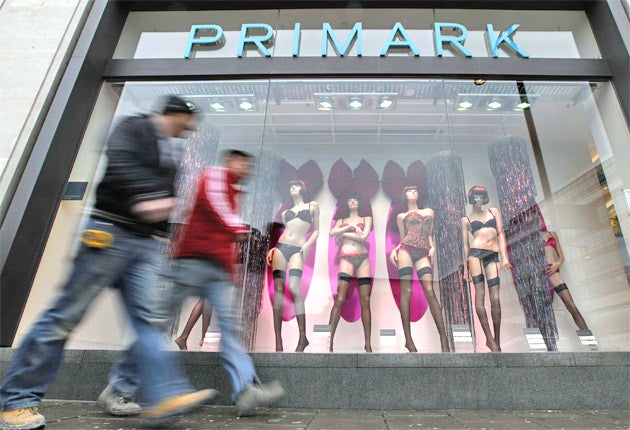Primark and the high street: Why are the workers who make our cheap clothes paying with their lives?
The fallout from last week's disaster has seen a period of panic for clothing brands while they wait to see whether any of their labels are found in the wreckage

Your support helps us to tell the story
From reproductive rights to climate change to Big Tech, The Independent is on the ground when the story is developing. Whether it's investigating the financials of Elon Musk's pro-Trump PAC or producing our latest documentary, 'The A Word', which shines a light on the American women fighting for reproductive rights, we know how important it is to parse out the facts from the messaging.
At such a critical moment in US history, we need reporters on the ground. Your donation allows us to keep sending journalists to speak to both sides of the story.
The Independent is trusted by Americans across the entire political spectrum. And unlike many other quality news outlets, we choose not to lock Americans out of our reporting and analysis with paywalls. We believe quality journalism should be available to everyone, paid for by those who can afford it.
Your support makes all the difference.Campaign groups around the world are rightly rounding on Primark following the tragic collapse of one of their suppliers' factories in Bangladesh last week which, at the last count, killed nearly 300 people.
Labels from a number of the UK's most popular – and profitable - High Street brands including Primark and Mango were found amongst the rubble.
But is Primark, with its cheap-as-chips, stack-'em-high sales pitch really the worst of the bunch when it comes to workers’ rights?
Sadly not.
The recent factory collapse is only the latest of many such incidents which happen every year in Bangladesh and other major garment-producing countries around the world. These incidents happen depressingly often due to a lack of health and safety regulations such as blocked fire escapes and lack of ventilation.
Just last year a massive factory fire at the Tazreen Fashions factory near the Bangladeshi capital Dhaka killed over 120 workers. On this occasion it was Walmart that was among those named and shamed.
So why are the workers who make our cheap clothes still paying with their lives?
The answer lies in the way that the global garment industry operates which allows companies to evade their responsibility for the often appalling sweatshop working conditions at these factories.
High Street companies don’t actually own any of the factories where their garments are produced. Instead they contract out production to factories all around the world.
A factory may be contracted to produce only one run of garments, or it may be used regularly by the same company over a period of years. Put simply, companies will opt for whichever factory offers them the cheapest price.
Campaigners have long been encouraging companies to pursue long-term agreements with suppliers so that they can better work together to improve conditions on the ground for workers.
The fallout from last week's disaster has played out in a well-rehearsed manner with a period of panic for clothing brands whilst they wait to see whether any of their labels are found in the wreckage.
Inevitably one or two brands will be proven to have links with the unlucky factory and they'll take the flack from press and campaigners. However, it’s almost certain that other labels lie undiscovered.
So if you want to avoid ethically dodgy High Street stores who should you avoid?
The bad news is that unpicking the threads of this issue is eye-wateringly complicated simply because it's virtually impossible to establish what clothes were made in what factory and whether the workers there are being paid a fair wage.
What we can say with certainty is that virtually all High Street stores have yet to produce concrete evidence that their clothing is sweatshop-free.
Only a handful of companies including M&S and Monsoon have policies in place that aim to guarantee that the workers making their clothing are being treated fairly. Even then, problems still occur all too often.
Ethical Consumer's Buyers' Guide to High Street clothes shops goes into some detail on who is best and worst in this regard.
So much for the bad news.
The good news is that here in the UK we have a thriving ethical fashion sector which is proving that your shirts and skirts can be produced without putting workers' lives at risk.
In the latest Ethical Consumer Product Guide to fashion we've named over a dozen Best Buy ethical clothing companies from Annie Greenabelle to THTC who are forging an entirely new business model for the clothing industry, one based on generating a market for artisan clothing from around the world rather than ripping-off workers.
Sure, buying clothes online isn't as easy as nipping down the High Street, but really, we need to stop making excuses. We now buy around four times as many garments ever year as we did in 1980. Frankly, the vast majority of this is entirely unnecessary.
My challenge to everyone is to halve the quantity of clothes you buy and double your spend on each item. Use your money wisely and you can stop supporting the sweatshop-producers.
And if you wanted to do something for Bangladeshi garment workers that doesn't cost a penny, then sign the online petition which the brilliant Clean Clothes Campaign is running with the help of local unions.
The petition is calling on clothing companies to sign up to an action plan to improve workers' rights and for a compensation package for the victims of last year's Tazreen fire.
Something as frivolous as fashion shouldn't be a life and death issue.
Join our commenting forum
Join thought-provoking conversations, follow other Independent readers and see their replies
Comments